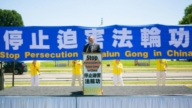【新唐人2012年8月11日讯】法国历史学家阿历克西•德•托克维尔(Alexis de Tocqueville)所写的《旧制度与大革命》,被公认是研究“法国大革命”的一部经典之作。这本书近期在北京城被知识份子、甚至中南海的领导人热烈讨论,香港媒体透露,中共国务院副总理王歧山忧心中国现代化转型,不会顺利,稍有不慎,甚至会引发“大革命”。
托克维尔的名言:“民主扩展个人自由的范围,而社会主义却对其加以限制;民主尽可能的赋予每一个人价值,而社会主义仅仅使每一个人成为一个工具、一个数字。民主是为了自由而追求平等,社会主义则是为了压迫和奴役,而追求平等。”
托克维尔认为,各阶级之间的紧张关系之所以加剧,主要是“中央集权制”的作用。据了解,法国在大革命前,已形成与欧洲其他国家无法比拟的“中央集权”的政治体制:也就是集行政、立法和司法权于一身的统一权力机构。
托克维尔在《旧制度与大革命》一书中发现,历史上的大革命,也就是暴力革命并非发生在贫穷时期,而是发生在经济上升并带来社会两极分化之后。因为在这种历史时刻,阶级矛盾激化,社会底层的民众特别容易把愤懑转变为战火。
比较“法国大革命”当时的社会背景,与现今的中国社会状况,有学者指出,实在是太像了!
原“北京大学”法律系讲师王天成:“因为这些年来,尤其是最近,改革的呼声高涨,但实际上他们有一个用意,就是说,你看我们还是不要改,一改反而更危险,一改的话可能会加快我们的崩溃,加快崩溃,社会控制不住,他们抱着这么一个观点看,这个观点是成问题的。”
原“北京大学”法律系讲师王天成认为,一个专制政府如果他拒绝改革,那他就是抗拒变化的潮流,那人们的自由就没有了希望,但是现实情况是,现在世界上有五分之三的独立国家变成了民主国家,这些国家很多都是靠民众的抗议,如果专制政权拒绝改革,就会像最近两年发生在突尼斯和埃及等国家的“茉莉花革命”一样。
王天成:“实际上你一定要认识到,你不改也是危险的,你不改也可能被推翻,当然你要改的话,就是如果你的战备、你的策略不对,你这个节奏、速度不对,你的目标不对,那你也有可能被推翻。”
王天成建议中共当局进行真正的民主转型,他说,真诚的启动这方面的改革,取得民众的信任,还有可能成功,如果慢慢吞吞,应付一下舆论,时间拖长,那政权很可能会被推翻。
王天成:“你以为你拒绝改革你就可以阻挡历史前进的步伐,那就错了,我们看到很多的专制政府,在一夜之间就崩溃了,一夜之间崩溃了!人民群众的抗议,就把它给推翻了,变成瘫痪,这种事情历史上见多了。”
香港《新维月刊》报导,消息人士透露,中共国务院副总理王岐山对当今中国忧心仲仲。“他认为,中国这样在世界上举足轻重的大国,从历史上看也好,今天的外部环境也好,现代化转型不会那么顺利。中国人自己的代价也没有付够。”
去年12月,香港《北运河出版社》出版的新书《十八大总理争夺战》中提到,王岐山也有自己的“死穴”。王岐山的“死穴”就是他所分管的金融系统出现了危机,而他难逃责任。
在此之前,《路透社》报导,王岐山曾在两会上透露自己“想修改刑法”,并大谈法治建设和人大立法工作。
采访/秦雪 编辑/周平 后制/广德
‘Old Regime and the Revolution’: Chinese Vice Premier Wang Qishan Concerned.
French historian Alexis de Tocquevilles “Old Regime
and the Revolution is widely acknowledged as a classical study of the French Revolution.
This work is being discussed heatedly by Beijing scholars.
Hong Kong media revealed that Wang Qishan, Chinese
Communist Party (CCP) Vice Premier is concerned about the modern China in transition.
If something does not go smoothly, and there
is carelessness would, it will cause a great revolution.
Tocqueville famously states, “Democracy extends
the sphere of individual freedom, socialism restricts it.
Democracy attaches all possible value to each man,
socialism makes each man a mere agent, a mere number.
Democracy and socialism have nothing
in common but one word: equality.
But notice the difference: while democracy seeks equality
in liberty, socialism seeks equality in restraint and servitude.”
Tocqueville believes the reason relationships between social
classes intensifies is due mainly to a centralized power.
According to this understanding, before the French
Revolution, France took on a centralized system incomparable to any other European country.
This placed executive, legislative and judicial
powers in a centralized authority.
The work “Old Regime and the Revolution” says that
great revolutions that have happened historically,
such as violent revolutions,
did not occur during a time of poverty.
They occurred when economic situations
brought polarization to society.
This is because at times like these,
conflict between social classes are incited.
It is easy for those at the bottom classes of the society
to turn their flames of their anger into flames of war.
Some scholars point out that the social background
at the time of French Revolution is very similar to the current conditions in China today.
Wang Tiancheng, Former Beijing University Law Professor:
“During these past few years, especially recently,
the call for revolution is becoming louder.
In reality, however, they have an intention,
which is not to change.
Once it becomes change, it will be more dangerous.
Change may speed up the collapse and
the society cannot control it.
They hold this perspective.
This is a problematic perspective.”
Wang also believes that if a dictatorial government refuses
revolution, then it is resisting the trend of change.
There is then no hope for people’s freedom.
But the reality is now many dictatorial countries
have become democratic countries.
This was largely due to popular protests.
If a dictatorial regime refuses a revolution, then
things like the Jasmine revolution will take place.
Wang Tiancheng: “In reality you have to realize that not
changing is also dangerous. You can also be overthrown.
If your strategies are not right, if your rhythm and speed
is not right, if your goals are not right, then you also face the possibility of being overthrown.”
Wang suggests the CCP should
truly start a democratic change.
He thinks that sincerely initiating a change
in this regard will gain the trust of people.
It also faces the possibility of a success.
If they are slow or don’t take public opinion seriously,
dragging out the time, then it is very possible the regime will be overthrown.
Wang Tiancheng: “Thinking that a refusal to change
can hinder the steps of history is wrong.
We saw a lot of dictatorial regimes collapse overnight,
and it collapses in just one night.
People’s protests overthrow it and paralyze it.
We’ve seen many things like this historically.”
Hong Kong’s Xinweiyuekan reported that CCP Vice Premier
Wang Qishan is very concerned about today’s China.
He thinks that as a large country,
which plays a decisive role in the world,
whether from a historical perspective or from the current
global environment today, China’s modern transformation will not be so smooth.
And Chinese people still have a long way to go.
In December last year, Hong Kong’s Beiyunhe Publishing
Incorporation’s new book “18th Battle of the Premiers”
mentioned that Wang Qishan also has his own “death point”.
His “death point” is that danger is surfacing within
the financial system that he is in charge of.
It would be hard for him to escape responsibility.
Prior to this, Reuters reported Wang disclosed
he wanted to amend China’s Criminal Law.
He spoke extensively on legislative construction
and the works related to enacting laws.



























